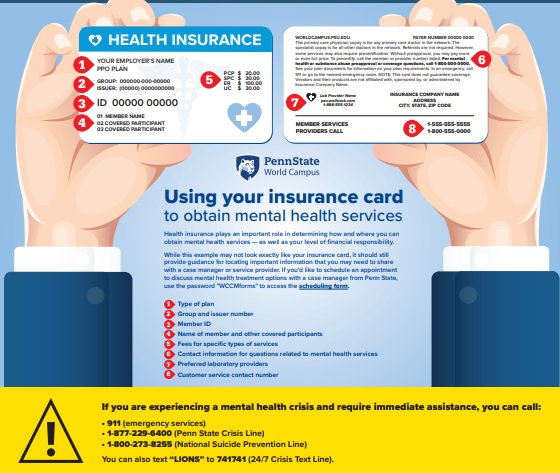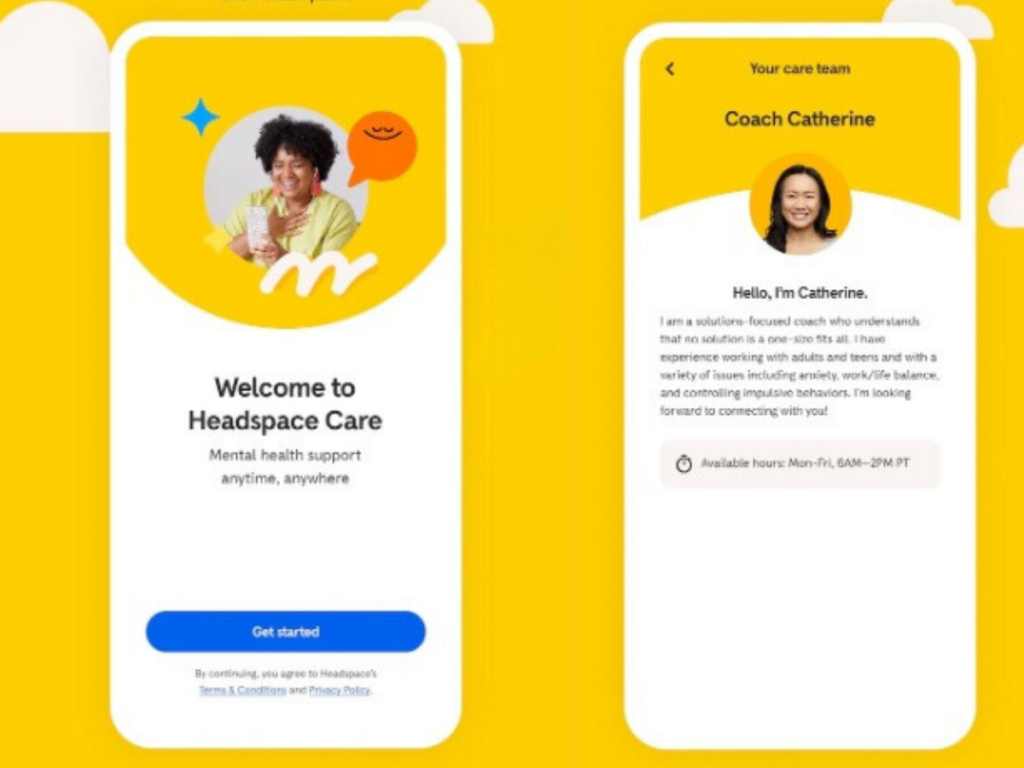
All of us need the help of others in our lives, and we all deserve to feel comfortable seeking it. Whether it be on a temporary or life-changing basis, it is okay to not be okay and to ask for help!
Penn State World Campus wants you to know that you are not alone. As part of Mental Health Awareness month, the Mental Health Services team of Student Affairs continues to highlight information to help reduce barriers that may impact your ability to access services.
Health insurance is one of those topics that few people enjoy talking about, but it’s something you can’t (or shouldn’t) avoid discussing.
Why you need health insurance
To access outpatient mental health services such as therapy or medication monitoring, most students need health insurance. There are a variety of ways to get insurance: being included on a plan obtained by a parent, guardian, or spouse/partner (if you’re eligible); enrolling in independent coverage through employment or the Marketplace; purchasing coverage through Penn State’s Student Health Insurance Plan; or obtaining insurance through a public program. No matter which route you take, insurance coverage is imperative for any health service access.
Public assistance insurance programs
You should not feel ashamed or embarrassed about applying for insurance coverage through a public assistance program if you are eligible to do so. They exist to help you move forward in life. Review Penn State’s guide to public assistance programs.
Like private insurance companies, public insurance programs are mandated by government mental health parity laws to provide behavioral health services (services related to mental health and/or drug and alcohol treatment) at an equal level as they do for physical health services. “Integrated” care is on the rise in many communities as an outcome of parity efforts.
Navigating health insurance limitations and challenges
Even with health insurance coverage, behavioral health services may be limited within the provider network of the insurance carrier itself, and may also be limited depending on access to the provider in the community. Insurance issues can be complex and confusing, so you will need patience as you review your plan information and educate yourself about the particular details of your coverage.
Review the infographic identifying important parts of your insurance card

Where to get help with insurance questions
If you have questions about your insurance coverage, you should start by contacting Customer Service at the number located on the back of your insurance card. They will often link you with a patient care coordinator, patient advocate, or similar representative, which is a great place to land in your first call. This means you will now be linked to a connection at your insurance company who can provide support consistently and who can help you understand your coverage and navigate claims approval/processing issues related to your health care needs.
These representatives can be a valuable resource. They are the experts, so reach out to them as often as necessary. Take advantage of their ability to help you identify, access, coordinate, and monitor services that address your needs. You can also spend some time exploring your insurance company’s website. All insurance companies offer an abundance of information in support of their members’ care.
Understanding coverage and costs
It’s important to understand the basics about your health insurance options, such as what specific plan(s) are available to you, what the provider networks look like under each plan, how to access the providers you want, and how to ensure that insurance will pay for the service (or at least some/most of it). Make sure you research what your out-of-pocket costs will be. You must consider co-pays along with deductibles and co-insurance. In addition, there are often various out-of-pocket costs involved with specific types of services, such as general practitioner visits, appointments with a specialist, and treatment at an emergency room or urgent care center.
Be patient and prepare for potential challenges
The health care workforce is stretched very thin right now, and resources may be limited in many places. No matter what type of health insurance you have, this may have a significant impact on members’ abilities to access the service in the community. You will likely need patience and understanding as you try to obtain services. The mental health case managers at Penn State World Campus are skilled in this area and will do their best to help students understand and access all of the options available.
Helpful resources
- Mental Health Awareness Month: Resources to Support Your Well-Being — this blog post reviews some of the mental health services and resources available to World Campus students
- World Campus Care and Concern — our Care and Concern staff can help students who are feeling challenged by a variety of situations, including academic distress, financial insecurity, death of an immediate family member, or a family crisis
- Disability Accommodations — find out how to contact World Campus Student Disability Services for any accommodations you may need to succeed in your courses



